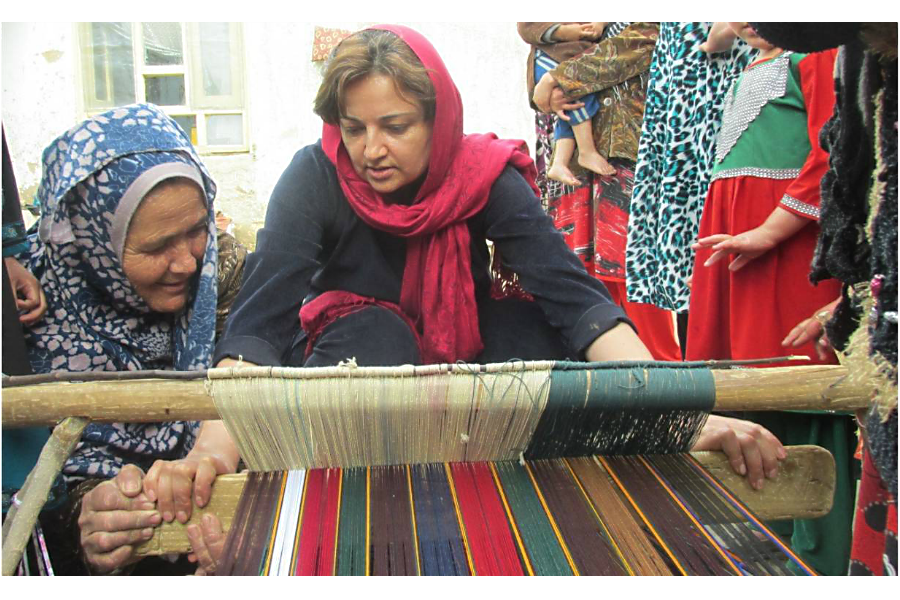BREAKING BARRIERS - Seema Ghani fled Afghanistan with her family in the 1990s during the country's civil war. She decided to return in 2002 to help rebuild her country. Last month, she earned the Bond Outstanding Individual Award.
 Women show Seema Ghani how to make shawls in Qizel Kent village, Afghanistan, in 2015.Courtesy of Hand in Hand Afghanistan
Women show Seema Ghani how to make shawls in Qizel Kent village, Afghanistan, in 2015.Courtesy of Hand in Hand Afghanistan
APRIL 10, 2017 LONDON—An Afghan woman who has worked as a civil servant, campaigner, management consultant and poet in both Afghanistan and Britain has been recognized for her work to empower women and create jobs.
Seema Ghani won the Bond Outstanding Inpidual Award, an international development award, on March 20 in London.
The daughter of an army officer, she fled Afghanistan with her family in the 1990s during the country's civil war, before pursuing a career as a consultant in London.
After the toppling of the Taliban in Afghanistan, she decided to come home to help rebuild her country in 2002.
"There's a bit of a patriot in me, I thought I had to give something back," Ghani told the Thomson Reuters Foundation at the Bond Annual Conference, where she received the award.
Wanting to help her country's war orphans, Ghani adopted 16 Afghan children aged 3 to 17 as a single woman.
After stints at the finance and labor ministries, she co-founded the People's Movement Against Corruption and later the Afghan Women's Charter to tackle graft and increase women's participation in politics and business.
"As a woman you just have to be extra loud," said Ghani. "My friends see me now and ask, 'What's happened to you, Seema? You look like a man!' " she joked.
As chair of Hand in Hand Afghanistan, an Afghan charity that fights poverty, she oversaw training that helped create thousands of businesses in remote areas of the war-torn country – with women making up 70 percent of the trainees.
"I like to say we don't give people fish, we teach them how to fish," said Ghani. "There is a tendency in Afghanistan to just rely on donor money – I'd rather help people stand on their own feet."
In addition to women, Ghani hopes to reach other marginalized communities such as hundreds of thousands of recent returnees from Pakistan and Iran, many of whom are living in deep poverty and bonded labor.
"Life as a refugee in Afghanistan is a nightmare and it's going to get worse," she said.
"We need to get serious about job creation programs rather than just promising refugees a better future, or they will have no choice but to leave."
Roughly 2.6 million Afghan refugees live in more than 70 countries, according to the United Nations, one of the largest such populations in the world.
• Reporting by Zoe Tabary, editing by Ros Russell. This story originally appeared on the website of the Thomson Reuters Foundation, the charitable arm of Thomson Reuters that covers humanitarian news, women's rights, trafficking, property rights, climate change, and resilience.
Page created on 10/26/2017 8:31:01 AM
Last edited 10/26/2017 8:44:10 AM
